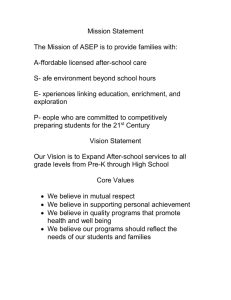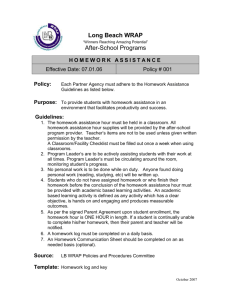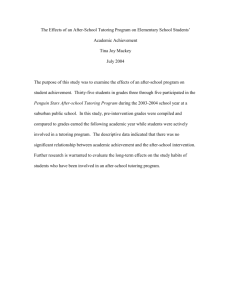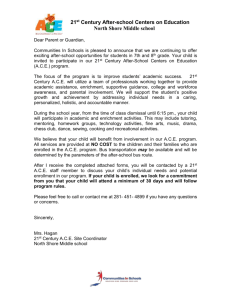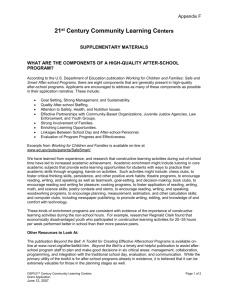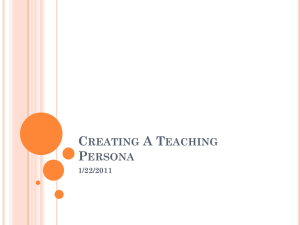Press Release 2014 Conf
advertisement
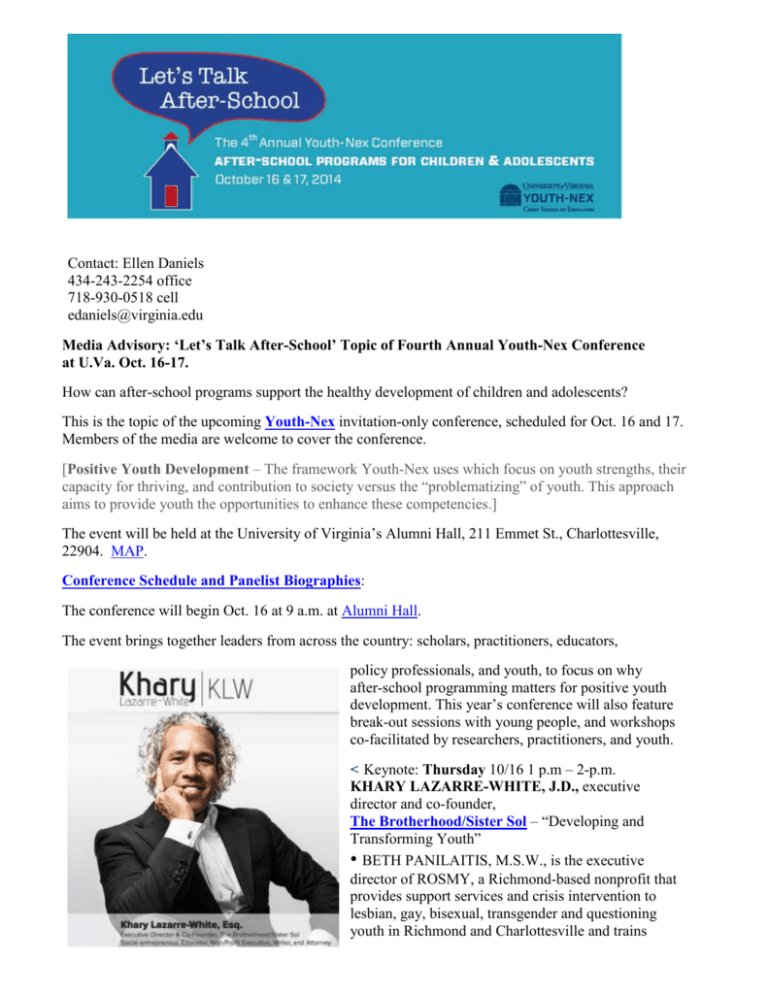
Contact: Ellen Daniels 434-243-2254 office 718-930-0518 cell edaniels@virginia.edu Media Advisory: ‘Let’s Talk After-School’ Topic of Fourth Annual Youth-Nex Conference at U.Va. Oct. 16-17. How can after-school programs support the healthy development of children and adolescents? This is the topic of the upcoming Youth-Nex invitation-only conference, scheduled for Oct. 16 and 17. Members of the media are welcome to cover the conference. [Positive Youth Development – The framework Youth-Nex uses which focus on youth strengths, their capacity for thriving, and contribution to society versus the “problematizing” of youth. This approach aims to provide youth the opportunities to enhance these competencies.] The event will be held at the University of Virginia’s Alumni Hall, 211 Emmet St., Charlottesville, 22904. MAP. Conference Schedule and Panelist Biographies: The conference will begin Oct. 16 at 9 a.m. at Alumni Hall. The event brings together leaders from across the country: scholars, practitioners, educators, policy professionals, and youth, to focus on why after-school programming matters for positive youth development. This year’s conference will also feature break-out sessions with young people, and workshops co-facilitated by researchers, practitioners, and youth. < Keynote: Thursday 10/16 1 p.m – 2-p.m. KHARY LAZARRE-WHITE, J.D., executive director and co-founder, The Brotherhood/Sister Sol – “Developing and Transforming Youth” • BETH PANILAITIS, M.S.W., is the executive director of ROSMY, a Richmond-based nonprofit that provides support services and crisis intervention to lesbian, gay, bisexual, transgender and questioning youth in Richmond and Charlottesville and trains human services providers and school personnel on working with LGBTQ young people. She has worked with homeless individuals and families, at-risk youth, incarcerated individuals and individuals who are dually diagnosed. In 2012, Panilaitis was named one of the Top 40 Under 40 by the Richmond publication Style Weekly. • RICHARD M. LERNER, Ph.D., is known for his theoretical contribution to developmental science, including his Relational Developmental Systems Theory of Positive Youth Development. In addition, Lerner has directed foundational studies of adolescence, most recently the 4-H Study of Positive Youth Development, a recently completed 10-year longitudinal study of more than 7,000 youth across the U.S. Lerner has written more than 650 scholarly publications, including more than 80 authored or edited books. He has received multiple recognitions for his contribution to developmental science, most recently the 2014 Gold Medal for Life Achievement in the Application of Psychology, awarded by the American Psychology Association. • JAMES PIERCE, M.Ed., is Executive Director of Boys & Girls Clubs of Central Virginia. In his 18 years of working with young people, he has served as a public school teacher and coach, school administrator and principal. During that span, the organization has doubled its membership and budget. The clubs work with approximately 2,000 young people, and opened a sixth club in the area this past summer. Main organizational goals are: promoting on-time graduation from high school, instilling healthy lifestyles and developing good character and citizenship. • ROBERT SHELTON is one of 12 youth who will participate in the conference. A high school junior, he has been attending the Music Resource Center for three years. The Music Resource Center is an after-school music education program that serves sixth- through 12thgrade students and offers them the opportunity to participate in all phases of music production in a state-of-the-art studio setting. The six conference panels are: Thursday, Oct. 16 Opening Panel: 9:30-11 a.m. • Why does After-School Matter from a Positive Youth Development Perspective? We can probably agree that after-school programs matter. But how does considering afterschool from a positive youth development lens shape how we think about the role and importance of after-school time? This panel will set the foundation for the conference by discussing the role of after-school in supporting positive youth development. Highlights include a 30-year follow-up from a key study of exemplar after-school programs, an exploration of after-school and extended learning in the middle school years, and the current policy context. Speakers and Topics: Milbrey McLaughlin, Ed.D. (Stanford University) – “Breaking the Cycle: A 30-Year Retrospective on the Contribution of a Community-Based Youth Program” Dru Tomlin, Ph.D. (Association for Middle Level Education) – “Triumphs, Challenges & the Bright Road Ahead: Young Adolescents, Effective Middle Schools, & OST” Karen Pittman (Forum for Youth Investment) – “Why Does After-School Matter from a PYD Perspective?” Panel One: 11:15 a.m. - 1 p.m. • Evaluating Outcomes of Effective After-School Programs Many after-school programs struggle with documenting the impacts their services have on youth. This panel will report on evaluation techniques on the effects of after-school programs. Panelists will discuss measuring youth participation and engagement, the average effects of after-school programs on different youth outcomes and measuring skill development, and will also present an example of how one organization has incorporated evaluation into its ongoing work. Jennifer Fredricks, Ph.D. – “Measuring Organized Activity Participation” Neil Naftzger (American Institutes for Research) – “Pathways to Supporting Positive Youth Outcomes in After-School Programs” Charles Smith, Ph.D. (Forum for Youth Investment) – “Quality in the Context of Outcome Evaluations” Allison Riley, M.S.W., Ph.D. (Girls on the Run International) – “Transforming One Girl at a Time: ‘Girls on the Run’ Philosophy and Processes” Keynote – 1:00 p.m. - 2 p.m: (details noted above, on page 1). KHARY LAZARRE-WHITE, J.D., executive director and co-founder, The Brotherhood/Sister Sol – “Developing and Transforming Youth” Workshop Sessions - 2-3:15 p.m. (Attendees will choose among those listed below) Workshops offer attendees the opportunity to engage in a small-group discussion of best practices in specific types of after-school programs. Six concurrent workshops will each be co-facilitated by a researcher and a practitioner and some will feature a youth from the practitioner’s program. The workshop will begin with brief presentations from each facilitator. Workshop attendees will then be invited to share experiences and practices and pose questions to the leaders. Opportunities and Challenges in: Comprehensive After-School Programs: Barton J. Hirsch, Ph.D. (Northwestern University), James Pierce, M.Ed. and Youth: Ariana Morris (Boys & Girls Clubs of Central Virginia) STEM and SEL After-School Programs: Gil Noam, Ph.D., Ed.D. (Harvard University), Kala Somerville and Youth: Erica Jackson, M.S.W. (Computers4Kids) Arts-Based After-School Programs: Valerie A. Futch, Ph.D. (University of Virginia), Sibley Johns, M.Ed, and Youth: Robert Shelton (Music Resource Center) Mentoring After-School Programs: Jean Rhodes, Ph.D. (University of Massachusetts Boston), Jackie Bright (Big Brothers Big Sisters of the Central Blue Ridge) Sports-Based After-School Programs: Rita DeBate, Ph.D., M.P.H., F.A.E.D., F.A.A.H.B. (University of South Florida), Ellen S. Markowitz, Ph.D. (SuperStarters Sports; PowerPlay NYC) Educational-Empowerment-Based Interventions: Paul C. Harris, Ph.D. and youth participants Kendell Dennis (Men Passionately Pursuing Purpose - MP3, University of Virginia), Carol Easterlin Freeman, M.Ed. (Charlottesville High School) Panel Two - 3:30-5 p.m. What Makes The Magic Happen? Key Components of Effective After-School Programs There are lots of moving parts in every after-school program. But what are the key ingredients that make a program truly successful? This panel considers what research and practice tell us about important components of programs and organizations. Panelists will focus on the importance of belief systems, creating relationships, the role of youth engagement and the practices of expert staff. Speakers and Topics Stanley Pollack (The Center for Teen Empowerment) – “Youth Leadership: Beliefs, Interaction, and Limit-Setting” Nickki Pearce Dawes, Ph.D. (University of Massachusetts, Boston) – “Youth Engagement in Organized Program Activities: Exploring the Impact of Peer Interactions” Reed Larson, Ph.D. (University of Illinois, Urbana) – “The Balancing Acts of Effective Youth Practice” Friday Oct. 17 Panel Three – 9:00 a.m.-10:45 a.m. Specialized Programs There are many different kinds of after-school programs, providing different types of services to different youth. This panel features four programs developed to serve either a specific population of youth or to provide a specific type of experience. Panelists, including some of the founders of the programs featured and youth who have participated in the programs, will consider the needs their programs were created to fill, challenges they have faced and how they have addressed those challenges, and what youth have gotten from their programs. Speakers and Topics Edith “Winx” Lawrence, Ph.D. and youth participant London Short (Young Women Leaders Program) – “Designed for Girls: The Young Women Leaders Program” Sarah Hernholm and Youths: Daniela Montes & Jovanna Sanchez (Whatever It Takes) – “Teen Social Entrepreneurs” Beth Panilaitis, M.S.W. and youth participant Elena Michaels (ROSMY) – “ROSMY: A Model for Supporting LGBTQ Youth” Gregg Croteau, M.S.W. and Alexi Ferbes (United Teen Equality Center) –“Strategies for Working with Proven-Risk Youth” Panel Four – 11 a.m. - 12:30 p.m. Views from the Field: What Staff, Youth, and Evaluators say about Best Practices This panel focuses on best practices from the views of evaluators, practitioners and youth. What can programs do, on a daily basis, to make their programs as effective as they can be? Panelists will talk about what we have learned about effective after-school programming from evaluations of summer learning programs as well as major after-school programs, on best practices in informal settings, and the importance of particular practices, such as mentoring, that occur within programs. Speakers and Topics Georgia Hall, Ph.D. (Wellesley College, National Institute on Out-of-School Time) – “Summer Slide: Not Your Average Playground” Brenda Abanavas and youth participant Melissa Gonzales-Maguiña (Intel Computer Clubhouse Network) – “The Impact of Effective Mentor Relationships in Promoting Successful Integration of STEM Activities in After-School Informal Learning Environments” Barton J. Hirsch, Ph.D. (Northwestern University) – “A Randomized, Mixed Method Evaluation of After-School Matters” Lunch / Breakout Session (concurrent) 12:30 p.m. - 1:30 p.m. Youth Perspectives: What Do Teens Want in After-School Time? Youths who are current or former participants in after-school programs will join attendees at their tables for an informal discussion about their experiences in after-school programming. They will discuss what they expect from after-school programs, and what attracts and deters them from participation. The youth will also field questions from those seated at their table. Wrap-Up Panel – 1:30 p.m. - 3:15 p.m. What have we learned over the past two days? How can we take what we have learned and apply it to our own work and to promoting after-school in a policy context? This panel will bring together themes from across the two days and consider next steps for the field in research, practice and advocacy. Panelists will consider: what makes quality programs, the importance of community partnerships, how to think about evidence more broadly and use it more effectively, how to reach kids who aren’t currently being served by an after-school program, and how to better evaluate programs from a PYD perspective to understand impact and inform practice and policy. Speakers Janet Kelley (Kelley Collaborative) Dale A. Blyth, Ph.D. (University of Minnesota) Richard M. Lerner, Ph.D. (Tufts University) Patrick H. Tolan, Ph.D. (Youth-Nex, University of Virginia) U.Va.’s Youth-Nex Center was established at the Curry School of Education to promote effective youth development by advancing research, training, and service. The center is a transdisciplinary, crossUniversity nexus, focusing on young people as capable assets to their communities and schools. ###
